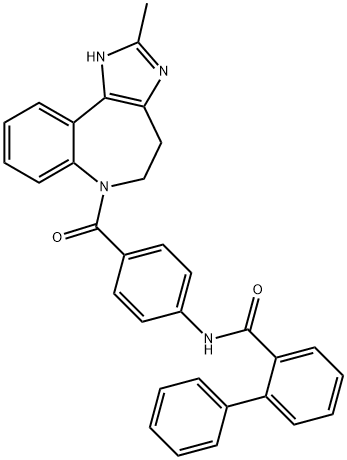
CONIVAPTAN
- Product NameCONIVAPTAN
- CAS210101-16-9
- MFC32H26N4O2
- MW498.583
- EINECS
- MOL File210101-16-9.mol
Usage And Synthesis
Conivaptan, a vasopressin antagonist, was discovered
and developed by Yamanouchi for the treatment of hyponatraeum
associated with congestive heart failure.
2-Methyl-1,4,5,6-tetrahydrobenzo[b]imidazo[4,5-d]azepine is an impurity of Conivaptan(C384700). Conivaptan is used in the treatment of congestive heart failures.
ChEBI: The amide resulting from the formal condensation of 4-[(biphenyl-2-ylcarbonyl)amino]benzoic acid with the benzazepine nitrogen of 2-methyl-1,4,5,6-tetrahydroimidazo[4,5-d][1]benzazepine. It is an antagonist for two of the three types of argini
e vasopressin (AVP) receptors, V1a and V2. It is used as its hydrochloride salt for the treatment of hyponatraemia (low blood sodium levels) caused by syndrome of inappropriate antidiuretic hormone (SIADH).
After looking at several different approaches to the synthesis, a convergent approach, shown in the Scheme 4, was developed
for large scale synthesis. Bromination of benzazepinone
10 with pyridinium hydrobromide perbromide in chloroform followed by recrystallization gave bromide 11.
Reaction of bromide 11 with ethaneimidate hydrochloride in
the presence of potassium carbonate in toluene or chloroform
gave the desired imidazole 12 in 69% yield. Although chlo-roform provided a slightly better yield, for large scale preparation,
toluene was used to minimize halogenated solvent
waste and because the quality of product was similar or better
than with use of chloroform. Deprotection of the tosylate
was found to be effective with heating the sulfonamide 12 in
80% sulfuric acid at 80oC. The benzazepinone product 13
was obtained in 90% yield after crystallization from acetonitrile
and water mixture.
Synthesis of the coupling partner 16 required to provide conivaptan was synthesized in 95% yield from biphenyl 2- benzoic acid via sequential reaction with thionyl chloride in toluene followed by coupling with aminobenzoic acid in acetone with N,N-dimethylaniline as a base. High quality acid 16 was obtained by crystallization from DMF and water. The acid 16 was activated by converting it into acid chloride with thionyl chloride in acenonitrile, to which was added imidazo benzazepine 13 in toluene and, after recrystallization in acidic ethanol, gave conivaptan hydrochloride (III) in 90% yield.
Synthesis of the coupling partner 16 required to provide conivaptan was synthesized in 95% yield from biphenyl 2- benzoic acid via sequential reaction with thionyl chloride in toluene followed by coupling with aminobenzoic acid in acetone with N,N-dimethylaniline as a base. High quality acid 16 was obtained by crystallization from DMF and water. The acid 16 was activated by converting it into acid chloride with thionyl chloride in acenonitrile, to which was added imidazo benzazepine 13 in toluene and, after recrystallization in acidic ethanol, gave conivaptan hydrochloride (III) in 90% yield.

PROMPT×
PROMPT
The What'sApp is temporarily not supported in mainland China
The What'sApp is temporarily not supported in mainland China
Cancel
Determine
